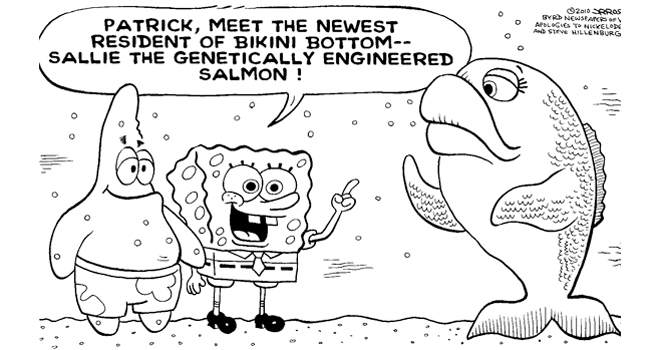The House on Wednesday voted to block the Food and Drug Administration from approving a Massachusetts company’s application to market genetically modified salmon to fish farmers in the United States.
If approved, it would be the first time that the government green-lights such modified animals for human consumption.
Applications for other kinds of genetically modified animals for food are in the pipeline.
But before they voted, a trio of House members conducted a spirited debate about the science behind the FDA approval process, perhaps previewing a wider public debate as the approval process pushes ahead.
In this case, a Republican House member stood up for the FDA, and two other House members with fishing industry constituents opposed the whole idea of breeding genetically engineered “Frankenfish.”
Industry observers expect the FDA to make significant progress this year in a lengthy, multi-year process to evaluate the safety and environmental impact of the fish.
But Rep. Don Young (R-AK), who sponsored the amendment to the agriculture spending bill that bans the FDA’s work to approve the marketing of the fish, questioned the science behind the FDA’s approval process.
“There’s no science in this,” he said Wednesday in a debate on the amendment on the House floor. “In fact, [some people say] we have to feed the world with artificial means. And I’m saying, OK. Do it someplace. But don’t you do it with my and our salmon.”
He also said he was concerned about the genetically engineered fish’s impact on Alaska’s economy.
Young’s comment was a reaction to Rep. Jack Kingston (R-FL) who said he was unhappy about Congress interfering with the independent scientific examination of the issue at the FDA.
“I do believe, in this case, the FDA is using sound science in a process that was approved in January 2009, and they are going through a process right now to make sure that this product does not have a problem as respects human consumption,” Kingston said.
The farming of the genetically engineered fish could ensure that more people could be fed, he noted. But that consideration has to be factored against the impact of potentially cheaper and more abundant supplies of fish on existing fishing communities.
“Our fishing communities are already facing challenges, and genetically engineered salmon would have an additional effect of lowering wild salmon prices, as already seen with normal farmed salmon,” argued Rep. Sam Farr (D-CA). “Lower prices, combined with declines in wild salmon stocks, would be economically detrimental to our fishermen, our fishing culture and our coastal communities. It is unnecessary to genetically engineer salmon.”
The genetically altered salmon is the work of a company called AquaBounty Technologies in Waltham, MA.
The company developed the technology for salmon, trout and tilapia to speed up the rate at which the fish grow. It says that faster growth would reduce the need for the big ocean pens in which farmed salmon are currently raised.
The Senate has not weighed in on the issue, according to Associated Press.









